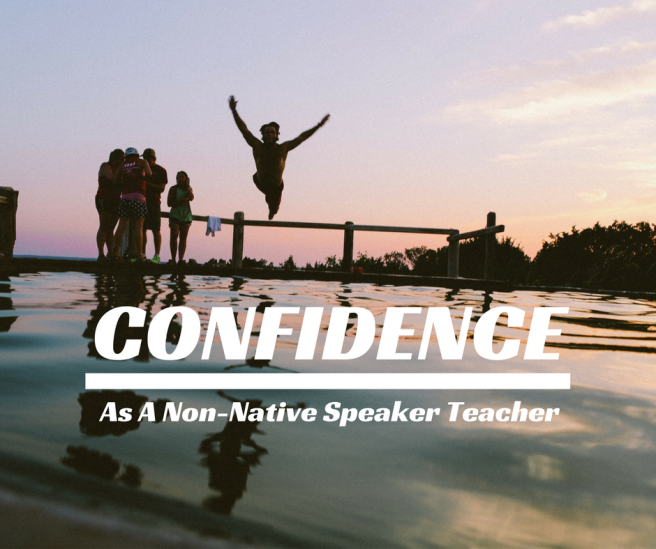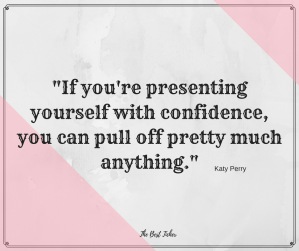
When I started this blog, I foolishly assumed that I was writing for an audience like my younger self: British (or perhaps American), relatively young (maybe one or two years out of university) who’d taken a TEFL course at least in part because it seemed like a good idea… and then who headed abroad to teach reluctant and terrified. I’ve realised however as my readership has grown that this is only a small part of my audience; there are lots of you out there who are non-native English speakers, working in your home country or trying to navigate the tricky world of visa applications and not having ‘the right’ passport.
A couple of weeks ago, a teacher emailed me asking for advice (you can do that by the way – my email is on the ‘About’ page). As I highly doubt she’s the only one in this position, my answer evolved into this blog post. So how can a non-native speaker teacher feel more confident speaking English in the classroom?
Students want native-speaker teachers, don’t they?
 The honest answer here is ‘not necessarily’. It’s become almost standard practice for language schools to advertise their native speaker teachers as a selling point, and this has a knock-on effect. Schools tell their students that they should want to learn from native-speakers, that native-speakers are better, online teachers sell themselves first and foremost as being native speakers… and so it’s hardly surprising that students have taken this on board. ‘Native English speaker’ has become just another marketing buzzword (as highlighted by the online advert I saw earlier this week: a ‘native English speaker’ advertising their services as an English teacher, written in what was, at best, intermediate level English). To some extent, yes, students want native-speaker teachers… but this is because they’ve been told to, rather than down to any kind of factual research.
The honest answer here is ‘not necessarily’. It’s become almost standard practice for language schools to advertise their native speaker teachers as a selling point, and this has a knock-on effect. Schools tell their students that they should want to learn from native-speakers, that native-speakers are better, online teachers sell themselves first and foremost as being native speakers… and so it’s hardly surprising that students have taken this on board. ‘Native English speaker’ has become just another marketing buzzword (as highlighted by the online advert I saw earlier this week: a ‘native English speaker’ advertising their services as an English teacher, written in what was, at best, intermediate level English). To some extent, yes, students want native-speaker teachers… but this is because they’ve been told to, rather than down to any kind of factual research.
Let’s not forget that in many countries, the profile of the ideal ‘English teacher’ extends to cover far more than native language. A friend of mine (white, native English speaker, South African) was asked to lie to students about her nationality and tell them that she was British. Fantastic teachers I’ve worked with who happen to not fit the ‘fair-skinned’ ideal have had their expertise as teachers questioned and been rejected by students on account of the colour of their skin. The world of TEFL (and TEFL recruitment) is unfortunately unethical and discriminatory… and it’s only slowly that this is starting to change.
All of this paints a pretty damning picture – but as mentioned, the situation is changing. In 2011, International House stated that their schools would no longer specifically recruit native-speaker teachers, and more and more jobs boards (and recruiters) are starting to reject the principle that native speaker equals more desirable teacher.
If you’re interested in some more in-depth reading (and what to see for yourself exactly what students thing, Ahmar Mahoob’s paper offers some real food for thought, including lots of direct quotes from students. You’ll see that in some cases students regard non-native speaker teachers as better than native speakers!
In my experience, students’ first priority is to learn. As long as you’re a good teacher, who cares what your native language is?
For a more detailed analysis of the ‘native speaker preference’ check out Andrew Woodbury’s excellent article.
Don’t native speakers make better teachers?
Think of a renowned scientist or academic. Are they necessarily equipped to go into a school and teach their subject? The same holds true for English teaching. Teaching encompasses a whole range of skills aside from just ‘knowing the language’ – if you’re ever in any doubt of that please watch this comedy sketch by Ricky Gervais and Karl Pilkington. Would any lesson you teach be more appropriately graded, better structured, and have better explanations than what these guys come up with? Then you already have proof that you’re a better English teacher than someone whose sole qualification is to be a native speaker.
I’ve spoken English my whole life – but had to work hard throughout my first couple of years of teaching to understand grammar in such a way that I could present it and explain it to my students. It’s all very well to be able to say ‘this is correct, and this isn’t’, but in order to teach a language you need to understand the nuts and bolts of it. Here, being a non-native speaker can actually be a huge advantage, as you’ve likely had to learn the language in a similar way to your students! As a non-native speaker of English, you’re automatically going to have a greater insight into what students are going to find challenging, what they’ll be confused by and what’s actually pretty straightforward. A native speaker will have to research all of those things – or find them out through trial and error.
I’ve been lucky enough to work with some excellent non-native speaker teachers throughout my career, and one thing that’s always struck me is how inspiring they can be for their students. At my first school, our Director of Studies was a non-native speaker – who had started her English studies as a child at the very school we worked at. How encouraging is that?! As a non-native speaker, you have the ability to show your students just what they can achieve – because you practise what you preach every day.
As a final note, if you still needed some more evidence that being a native speaker makes you a better teacher, check out what my students said. From time-to-time I always like to ask my students what they think makes a good teacher (I repeated a version of this activity recently with my adult elementary class) – and whilst they have said ‘you must speak English’, no student has ever specified that a good teacher must be British, or American, or even a native-English speaker.
How can I feel more confident?
Hopefully realising that your students don’t necessarily want native-speaker teachers,  and that being a native-speaker doesn’t automatically qualify you to be a better teacher is already making you feel more confident. But what can you do to give yourself an extra boost?
and that being a native-speaker doesn’t automatically qualify you to be a better teacher is already making you feel more confident. But what can you do to give yourself an extra boost?
- Fake it til you make it. There’s a lot to be said for acting confident, even if you don’t always feel it. Using positive body language, rehearsing what you’re going to say and how you’re going to say it, and even simply going into the classroom with a positive outlook can make a real difference in how confident you appear – and ultimately how confident you feel.
- Build your confidence in the language. It should hopefully go without saying that as teachers, we should never stop learning. Consider studying for an exam (maybe IELTS or CAE/CPE), and above all, practise, practise, practise. As you grow more confident in using the language in general, it follows that you’ll grow more confident in using it in the classroom too.
- Experiment, be yourself, and have some fun. Being able to laugh at your own mistakes helps! I asked non-native speaker friends and colleagues for advice while writing this post, and this was some of the best advice I was given. Remember that being a teacher is so much more than simply your knowledge of the language, and your students will appreciate your being yourself.
You can find some more tips on how to be a more confident teacher here.
But what if I make mistakes?
what if I make mistakes?
I’ll let you into a secret: I make mistakes too! From my early attempts at grading language where I realised I was missing out articles and actually saying things that were grammatically incorrect, to the sleepy coffee-free Monday morning not so long ago where I spectacularly stuffed up a grammar explanation… we all make mistakes from time to time.
If you do make a mistake, be honest about it – much of this advice also holds true here. Then take a deep breath and move on; the absolute worst thing you can do is to beat yourself up over it.
What can I do to improve my English?
First of all, think about what you’d recommend for your students! Teaching gives you a real advantage here, as it means you have a much clearer idea of what works and what doesn’t. If you’re still looking for some advice, here’s what I’d recommend:
- Practise! It probably goes without saying, but to confidently use English in the classroom, the key is practise, practise, practise. Although reading and writing in English will doubtless be helpful, I’d recommend focusing slightly more on speaking and listening, as these skills are what you’re going to be using in class on a daily basis.
- Watch films/TV/listen to the radio or podcasts. Depending on your work context, it might be difficult to get lots of exposure to fluent spoken English. The internet is your friend! I recommend to almost all of my students that they find films or a TV series they like, and regularly watch them in English. If TV isn’t your thing, how about listening to the radio or English-language podcasts – you can even do it while you’re at the gym, on public transport, or doing the housework.
- Use English as much as possible. Put all your electronic devices into English, write shopping lists/to-do lists in English, even switch your ‘internal monologue’ into English and talk to yourself (either in your head or out loud) – exposing yourself to the language as much as possible will make you feel far more confident in using it.
- Teach ‘mock’ lessons. This might be a bit of a weird one, but hear me out. In teaching, some of the language we use can be quite different to what we encounter in every day life, and the only real way to practice it is by teaching. This can help you to rehearse parts of explanations or giving instructions for a task. If you don’t have a willing friend or family member that you can teach a small section of something to, I find both pets and teddy bears to be helpful substitutes (with the added advantage that they don’t answer back!).
- Take a course. If you’ve got time and money available to you (let’s face it, no one went into EFL teaching in order to get rich), you might want to take a course. If you want to take something that’s specifically aimed at English language teachers, here are some offered by TEFL Equity Advocates, as well as this one by Future Learn. There’s also a recording of a great webinar on language development for teachers here.
How do I get a job with the ‘wrong’ passport?
As a Brit I’m all too aware that I’m not in the best position to offer advice – but I can point you in the direction of people who can.
TEFL Equity Advocates – this is an absolutely fantastic website, full of advice, articles, and resources. This site has been the source of several of the articles I’ve linked to in this post, and I wish I’d been able to link to even more of them! For your sanity I won’t, but please, if you do one thing, check out this site.
If you’re a regular user of Facebook, you might want to check out their official facebook group, or this group for non-native speaker teachers.
Although it might seem like you’re fighting a losing battle, please don’t give up – keep fighting. Hopefully one day in the not too distant future the TEFL world will become one of equal opportunity for everyone.
If you enjoyed what you read here, please consider signing up for my newsletter mailing-list: I’ll send you a monthly round-up of resources and ideas I’ve loved each month, and the occasional extra freebie too! If you’re a new (or newish, or new-at-heart) teacher who’d like a bit of extra support, check out my ELT support group on Facebook – TEFLing Together.

It’s a shame that non-native speakers (many of whom probably speak English more accurately than I do) are stigmatised in this way. I think the students play a significant role in this issue though, especially at a higher level (e.g. university). I teach a Business English postgraduate class (on the sole basis I’m a native speaker of English) and find it slightly intimidating – though the students are lovely, they’re so good at English (virtually bilingual) that it can make lesson planning overwhelming for me. One of my colleagues (a native French speaker) runs questions past me on occasions to know if things “sound” right because otherwise her students will challenge her judgement (rudely). I’ve often told her she’d be far better at teaching grammar than I am, as I’ve never properly learnt it and therefore lack the ability to explain grammatical concepts without copious reading in advance!
LikeLike
Great post Elly! You inspired me to write my considerations on the topic… 🙂
LikeLike
Brilliant stuff! Students need teachers, not people who happen to have been born in a particular country. I expressed my own thoughts on the matter just a few weeks ago https://infinite-coincidence.com/2016/12/28/merida-the-changing-faces-of-english-language-teaching/.
LikeLike
Great article! I read an interesting article on Native vs Non-native speakers in Spain and how they are treated here: https://teachinginspainblog.wordpress.com/2017/01/17/natives-vs-non-natives-our-experience-in-spain/
LikeLike
Another thing non-native speaker teachers could do is be inspired by all of the great blogs out there which are written by people in the same position they are in. Here are just three:
– Giulia (who posted above!): https://wanderingelt.com/
– Hana Ticha: https://hanatichaeltblog.wordpress.com/ – Hana has written about how she keeps up her English, though I remember where the post is
– Svetlana Kandybovich: https://eltcation.wordpress.com/
– Cristina Cabal: http://www.cristinacabal.com/
Great post Elly, as always!
Sandy
LikeLike
Thanks Sandy – I couldn’t agree more! 🙂
LikeLike